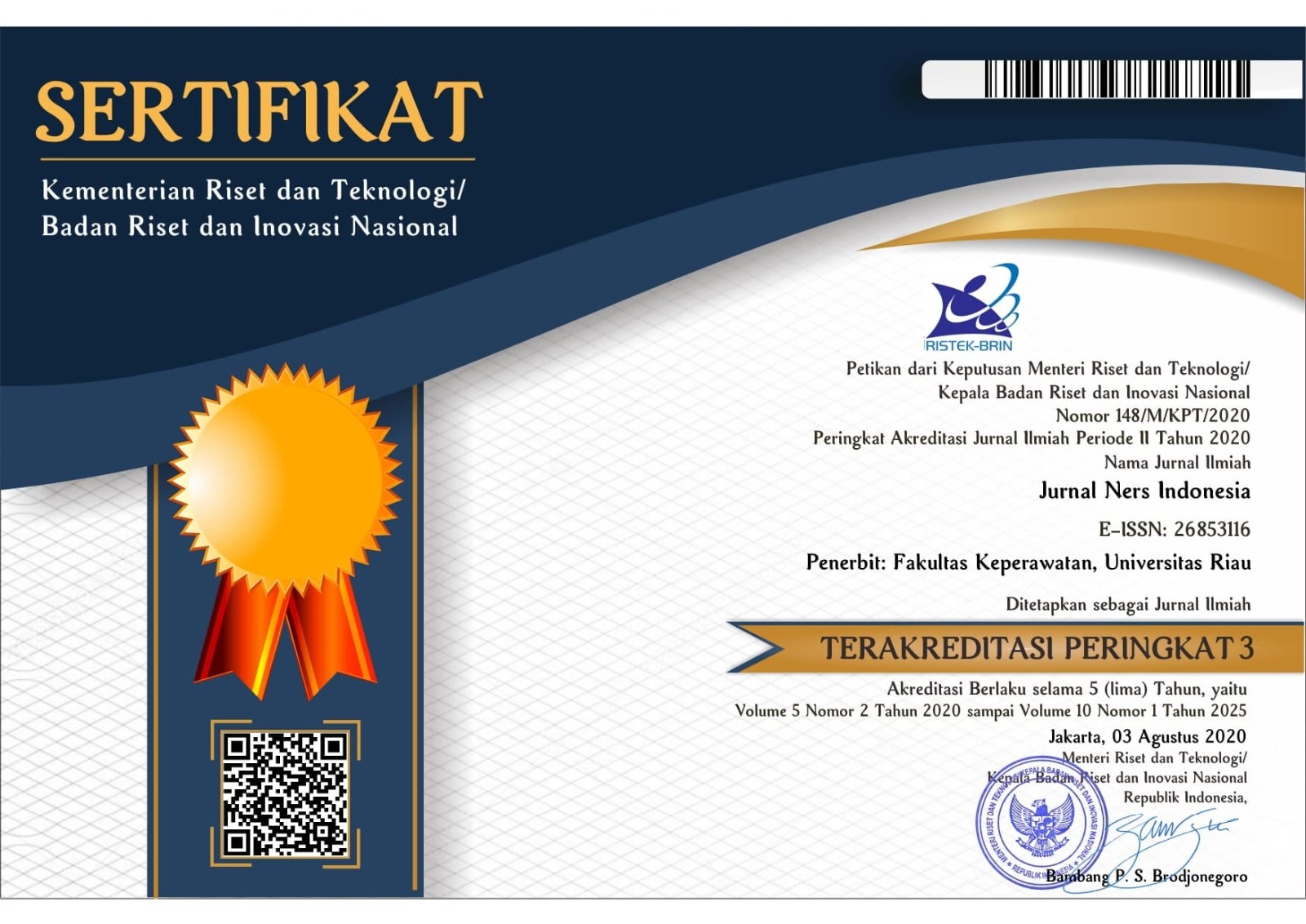HUBUNGAN KECANDUAN GAMES ONLINE TERHADAP PERKEMBANGAN PSIKOSOSIAL ANAK USIA SEKOLAH DASAR
DOI:
https://doi.org/10.31258/jni.14.1.19-27Keywords:
school-age children, online games, psychosocial developmentAbstract
Online games are online games that are played on computers, smartphones and other gaming devices. One of the users is school-aged children. Addiction to games in school children is characterized by playing outside the allotted time which has a negative impact on their psychosocial development. The purpose of this study was to determine the relationship between internet gaming and the psychosocial development of elementary school students. Descriptive correlation with a cross-sectional approach is used as a research method. In this study there were 65 respondents who were selected based on inclusion criteria using a stratified random sampling technique. The measuring tool used is a questionnaire that has been modified by the researcher. The results showed that most of the respondents were 11 years old (47.7%) and male (60.0%). The average time to play games is not more than 1-3 hours/day (67.7%), most of the respondents are identified as addicted to online games (67.7%) and have adequate psychosocial development (58.5%). Analysis using Fisher's exact test shows that p-value (0.00) < α (0.05) means that there is a relationship between online games and the psychosocial development of school-age children. Parents and teachers are encouraged to work closely with the health care team to identify a child's play disorder that affects psychosocial developmentReferences
(APJII), A. P. (2017). Infografis penetrasi dan perilaku pengguna internet Indonesia survey 2017. https://www.apjii.or.id.
Adinigitiyas., S. W. (2017). Peran Guru Dalam Mengatasi Kecanduan Game Online. KOPASTA: Journal of The Counseling Guidance Study Program , 4(1).
Aklima, F. N. (2019). Hubungan Intensitas Bermain Game Online dengan Prestasi Belajar Siswa di SD Negeri 2 Banda Aceh. Jurnal Tunas Bangsa. 6(2), 302-310.
APJII. (2014). Rekrutan Pengguna dan Pemakai Internet di Indonesia (Online). http://www.apjii.or.id.
Beranuy, M. C. (2013). (A Qualitative Analysis of Online Gaming Addicts in Treatment. . International Journal of Mental Health & Addiction. , Vol 11 Issue 2.
Beranuy, M. C. (2013). A Qualitative Analysis of Online Gaming Addicts in Treatment. International Journal of Mental Health & Addiction., Vol 11 Issue 2.
Damayanti, R. L. (2019). The Efforts to Increase Knowledge About Balance Nutrision at Elementary School Children. Darmabakti Cendekia, 1(1), 28-33.
Guno., D. C. (2018). Gambaran Perilaku Kecanduan Games Online pada Anak Usia Sekolah di Wilayah Kecamatan Magetan. http://emprints.ums.ac.id.
Hakiki, A. &. (2021). Efek Negatif Bermain Game Online “Free Fire Battlegrounds” Terhadap Akhlak Remaja di Desa Ambulu Kabupaten Jember. Solidarity: Journal of Social Studies, 1(2).
Halawa, A. (2018). Hubungan Bermain Game Online Dengan Prestasi Belajar Siswa Kelas 4 Di MI Darussalam Jambangan Surabaya. Jurnal Keperawatan, 7(1).
Irwanto, A. (2020). Hubungan Antara Kecanduan Game Online Dengan Perkembangan Psikososial Pada Anak Usia Sekolah. Doctoral Dissertation, Universitas Kusuma Husada Surakarta.
Julia, P. (2018). Hubungan antara Kecanduan Game Online terhadap Prestasi Belajar Siswa SD Negeri 53 Banda Aceh. Jurnal Serambi Academica, 6(1), 49-57.
Khan, M. (2007). Emotional and Behaviour Effects of Video Games and Internet Overuse. Report of Council on Science and Public health.
Kineret, R. I. (2021). Gambaran Karakteristik Anak yang Mengalami Kecanduan Bermain Game Online. . Aisyiyah Surakarta Journal of Nursing, 2(2), 9-13.
Lestari, Y. J. (2019). Dampak Game Online Terhadap Perilaku Siswa di Madrasah Tsanawiyah Negeri (MTSn) 4 Kota. Doctoral Dissertation, UIN Sulhan, Thaba Saifuruddin Jambi.
Masthura, S. I. (2018). Hubungan Penggunaan Gadget dengan Perkembangan Psikososial Anak Usia Sekolah di SD Negeri 1 Kota Banda Aceh. Jurnal Aceh Medika, 2(1), 171-175.
Nurdilla, N. A. (2018). Hubungan Kecanduan Bermain Game Online dengan Kualitas Tidur Remaja. Jurnal Online Mahasiswa (JOM), Bidang Ilmu Keperawatan, 3(2), 2271-2279.
Saifullah, M. (2018). Hubungan Penggunaan Gadget Terhadap Pola Tidur Pada Anak di Sekolah UPT SDN Gadingnejo II Pasuruan. Doctoral Dissertation, Fakultas Keperawatan.
Saryati, S. (2016). Analisa Faktor Perilaku Seksual Pada Anak SD di SDN Dukuh Kupang II - 489 Kecamatan Dukuh Pakis Kelurahan, Dukuh Kupang Surabaya. ADLN Perpustakaan Universitas Airlangga, 11-76.
Suryanto, R. &. (2019). Dampak Positif dan Negatif Permainan Game Online dikalangan Pelajar. Jurnal Online Mahasiswa (JOM) Bidang Ilmu Sosial dan Ilmu Politik, 2(2), 1-15.
Syifa, L. S. (2014). Dampak Penggunaan Gadget Terhadap Perkembangan Psikologi pada Anak Sekolah Dasar. Jurnal Ilmiah Sekolah Dasar, 3(4), 538. http://doi.org/10.23887/jisd.v3i4.22310.
Vollmer, C. H. (2014). Computer Game Addiction in Adolescents and Its Relationship to Chronotype and Personality. . SAGE OPEN, https//www.researchgate.net/publication
Downloads
Published
How to Cite
Issue
Section
License
Copyright (c) 2023 Emmelia Christin Simatupang, Sri Wahyuni, Hellena Deli

This work is licensed under a Creative Commons Attribution 4.0 International License.











